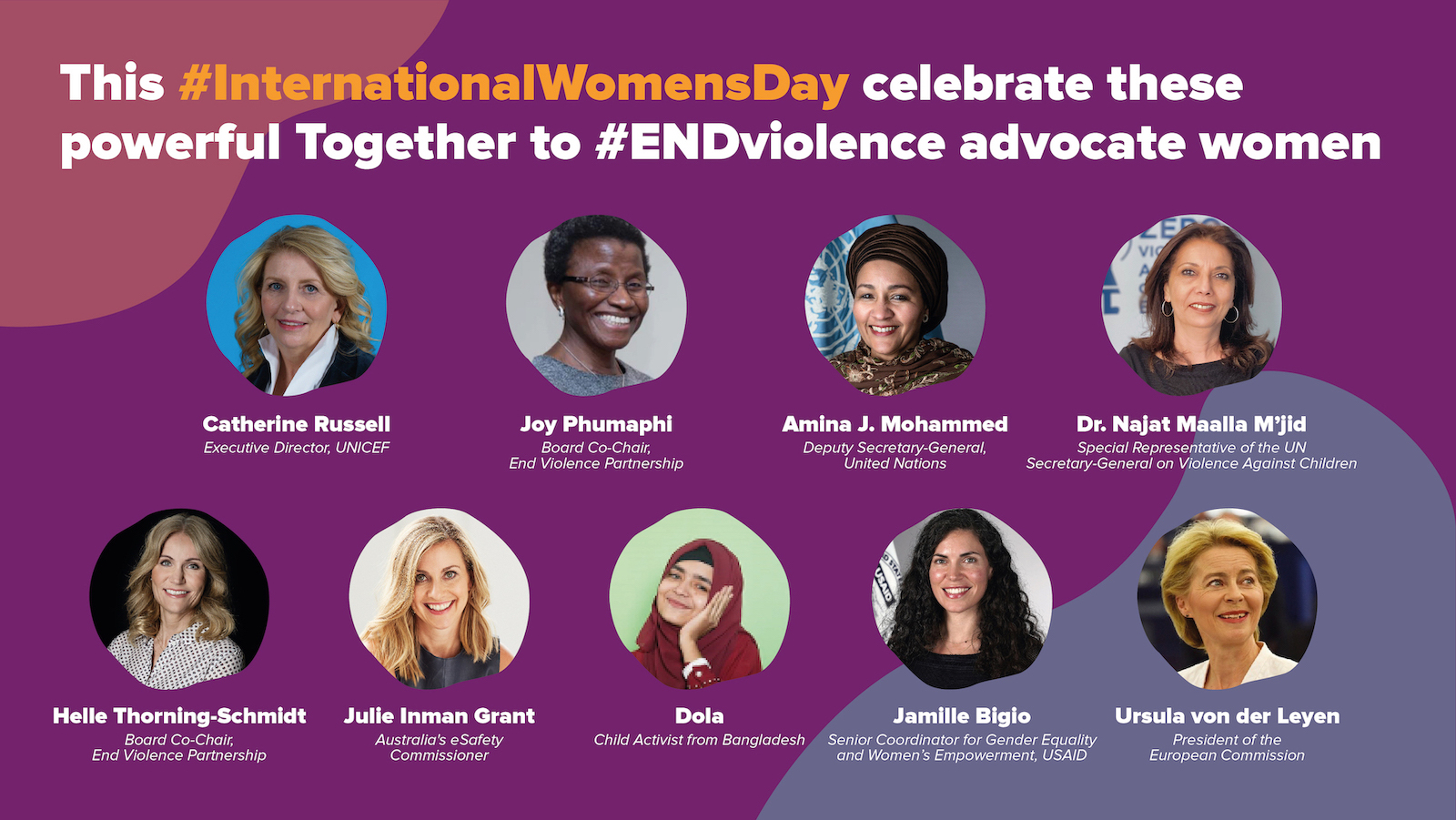
Today, on International Women’s Day, End Violence is celebrating some of the women making significant contributions towards ending violence against children.
Violence against children, including gender-based violence, is near universal. Social norms and conditioning have contributed to the prevalence of violence against girls and boys in different ways. Girls are disproportionately affected by sexual violence in all settings, with as many as 150 million girls worldwide subjected to it each year, usually by someone they know. And this does not include the estimated 60% of cases of sexual violence that go unreported. Around 650 million women alive today have been married under the age of 18, and the pandemic has put tens of millions more at risk. 200 million women and girls have experienced female genital mutilation. This violence translates to the online world, where a large amount of child sexual abuse material involves women and girls, and they are also more likely to be targets of online abuse, exploitation and grooming.
But powerful women, including those in leadership and those who have witnessed and survived violence, are challenging the status quo and driving change for girls and boys from local through global levels. Here are the Together to #ENDviolence advocates:
Amina J. Mohamed, Deputy Secretary-General of the United Nations is calling for children’s rights and well-being to be at the centre of the 2030 Agenda. With only 7 years to go to achieve the ambitious Sustainable Development Goals, she has highlighted that tackling violence against children is a necessary pre-condition to meet every goal, be it health, education, or gender-equality – and failing to end violence puts all goals at risk. “The level of political and financial commitment to this issue must match the scale of violence faced by children,” she said.
The level of political and financial commitment to this issue must match the scale of violence faced by children.
Many other women in global leadership are also speaking out powerfully – Dr. Najat Maalla M’jid, the UN Secretary-General’s Special Representative on violence against children and End Violence Board Member. Dr. M’jid is shedding light on the huge cost of violence against children being paid by individuals, societies and countries – making the case that investing in violence prevention should be integral to every government’s economic and development strategy.
Watch her call to action.
Ursula von der Leyen, President of the European Commission spoke about the groundbreaking legislation proposed by the EU on preventing online violence against children The new proposed law is set to make detection, reporting and removal of child sexual abuse material mandatory for all internet service providers and platforms. It presents an exceptional opportunity for the EU to set high standards to protect children online through policy action.
Helle Thorning-Schmidt, Board Co-Chair, End Violence Partnership is making the case to come together and act, building on our learnings and solutions. “We know that violence against children is wrong. We know that it undermines all other investments in their health, education and development. We know what works to stop it. And we know that it makes economic sense to prevent it.”
She is echoed by Joy Phumaphi, Board Co-Chair, End Violence Partnership who is calling for society to work together and turn times of challenge and change into opportunity. She stresses the need to invest in and amplify these for progress, supporting the six Together to #ENDviolence policy proposals that calling on all leaders, everywhere to end violence against children in all settings.
Sima Sima Bahous, Executive Director, UN Women is shedding light on the multiple and intersecting forms of violence faced by women and children, and the need to address the root causes of this. Evidence shows that gender equality and the promotion of equitable social norms are protective factors against both violence against women and violence against children. “ Addressing the intersections between violence against women and children needs to be at the heart of a comprehensive approach to both prevention and response,” she says.
Government leaders are working towards change within and between countries. Australia’s first-ever e-safety commissioner, Julie Inman Grant, is paving the way for a safer Internet through innovative policy and governance and ministers from the UK and Sweden highlighting action and sharing solutions to keep children safe at home, online, in schools and their communities.
These leaders are joined by the most courageous and powerful voices – survivors of childhood violence.
Samantha Morton, actor and activist, shares her powerful story of being a survivor of violence in childhood – she is speaking up about facing and witnessing emotional, physical and sexual violence while growing up in the care of the state, in children’s homes, with foster families or in homeless hostels. “Throughout all of this, there was the experience of violence. – physical violence, sexual violence, emotional violence. And all this from the adults who should have been protecting me” she shares.
And she using her story to make sure children don’t have to go through what she did. “In my lifetime, I want to see children afforded the same legal protection from assault as adults,” said Morton. “I want to see England following the footsteps of the many countries worldwide – including our neighbouring countries Scotland and Wales – to make it illegal to physically discipline a child.”
In my lifetime, I want to see children afforded the same legal protection from assault as adults.
The global survivor-led Brave Movement is demanding an end to childhood violence. They are calling for leaders to place the issue on the global agenda – including calling on G7 countries’ commitment to and prioritisation of ending childhood sexual violence.
Watch two survivors and members of the movement Wibke Müller and Tabitha Mpamira, share their demands for healing, prevention and justice.
Let us include survivor voices. Nothing should be done for us without us.
Wibke Müller and Tabitha Mpamira, Brave Movement
Meet more powerful advocates working to #ENDviolence against girls and boys, everywhere
